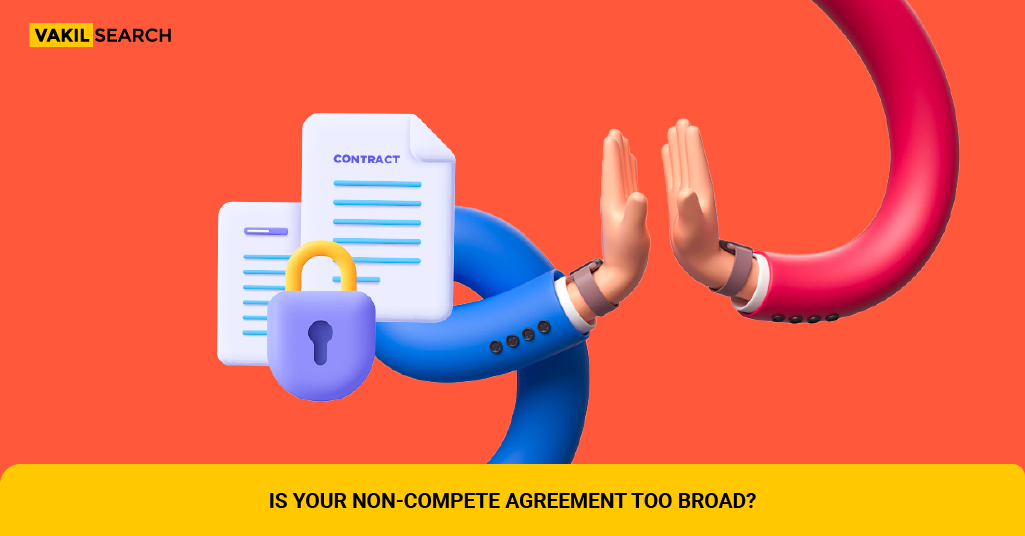Non-compete agreements can be overly restrictive, limiting your ability to work. This article explores the key factors to consider to ensure your agreement is fair and reasonable.
Non-compete agreements are contractual clauses that prevent employees from working for competing firms or starting their own competing business for a specified period after leaving their current employer. These agreements are commonly used to protect employers’ interests and safeguard their business information, trade secrets, and intellectual property. However, non-compete agreements are also controversial and criticised, particularly when they are overly broad and restrictive.
In India, Non-compete agreements are governed by the Indian Contract Act, 1872, which allows parties to include such clauses in their employment contracts, provided that they are reasonable and do not violate the employee’s rights. However, what constitutes a ‘reasonable’ non-compete clause is a matter of debate, and many employees and labor activists argue that such agreements are often too broad and unfair.
This article will discuss the issues related to non-compete agreements in India and examine whether your non-compete agreement is too broad.
The Scope of the Non-Compete Clause
One of the main issues with non-compete agreements is their scope. A non-compete clause that is too broad can prevent employees from finding work in their chosen field or industry, even if their new job has no direct competition with their previous employer. For example, a non-compete agreement that prohibits an engineer from working for any technology company in India for five years after leaving their current employer would be considered too broad and unreasonable.
Indian courts have consistently held that non-compete clauses should be limited to the specific business interests that the employer seeks to protect. The scope of the non-compete clause should be reasonable and proportionate to the employer’s legitimate interests. Therefore, it is important to carefully review the language of your non-compete clause and ensure that it is limited to the specific areas where your employer has a legitimate interest in protecting.
Duration of the Non-Compete Clause
Another issue with non-compete agreements is the duration of the clause. A non-compete clause that is too long can severely limit an employee’s ability to find new employment and earn a livelihood. In India, the courts have held that non-compete clauses should be limited in duration and not exceed the maximum two years.
Employers often argue that longer durations are necessary to protect their business interests, but it is important to remember that the interests of the employee should also be considered. It is advisable to negotiate the duration of the non-compete clause with your employer and ensure that it is reasonable and proportionate to the interests of both parties.
Geographic Scope of the Non-Compete Clause
Another important factor to consider is the geographic scope of the non-compete clause. A non-compete clause that applies to a large geographic area, such as an entire country or region, can be overly restrictive and unfair. In India, courts have held that the geographic scope of the non-compete clause should be limited to the areas where the employer has a legitimate business interest.
For example, if the employer operates in a specific city or region, the non-compete clause should be limited to that area. If the employer operates in multiple cities or regions, the non-compete clause should be limited to those areas where the employer has a significant business presence.
Enforceability of the Non-Compete Clause
Even if a non-compete clause is properly drafted and limited in scope, it may still be unenforceable if it violates the employee’s rights or is contrary to public policy. Indian courts have held that non-compete clauses should not be used to prevent employees from earning a livelihood or to restrain their trade.
In addition, non-compete clauses should not be used to retain employees against their will or as a substitute for fair compensation and working conditions. Employers should also ensure that the non-compete clause does not conflict with any laws or regulations governing the employment relationship.
If you believe your non-compete agreement is too broad or unfair, you should seek legal advice from an experienced employment lawyer. An employment lawyer can review the terms of your agreement and advise you on your options for challenging its enforceability or negotiating more favourable terms with your employer.
Conclusion
Non-compete agreements can be an important tool for protecting employers’ legitimate business interests. Still, they should be carefully drafted and limited in scope to ensure that they do not unfairly restrict the rights of employees. When reviewing your non-compete agreement, pay close attention to the scope, duration, and geographic limitations of the clause, and seek legal advice if you have any concerns about its enforceability or fairness.
Vakilsearch, as a legal services provider, can help individuals navigate the complexities of non-compete agreements. Our experienced employment lawyers can review the terms of your agreement and advise you on its enforceability and any options for negotiation. We can also help you draft a non-compete agreement that is fair, reasonable, and compliant with Indian employment laws. Contact Vakilsearch today for expert legal guidance on non-compete agreements and other employment-related issues.
Also Read:
- About Non-Compete Agreement
- Top 10 Mistakes With Non-Competition Agreements
- Process for Non-Compete Agreement


